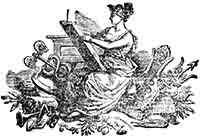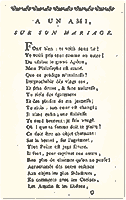OF all nations the French and the Italians have produced the greatest number of distinguished women. England is well behind, notwithstanding its Miss Burney, its Lady Morgan, its Baillie, its Jeanne Porter, its E. Spence, its Anne Radcliffe, its Miss Edgworth, its Benger, its Caroline Lamb. Usually, among that race, you find more novelists than intellectuals, scholars or poets.
Italy, by contrast, rich in all kinds of genius, presents among other remarkable women Richarde de Salvaggi, Véronique Gambara, Clarice de Médicis, Strozzi, Thérese Pamphile, Anne Glofarina, Cassandre Petrucci, Hippolite Torella, Hortense Strébillini, Hélène Riccoboni, Lucréce Marinelli, Modeste Pozzo, who wrote an epic poem and a Treatise on the Virtue of Women, and Marguerite Parrochia, also author of a poem, with Scanderberg as its hero, that she did not have time to complete.2
Our country, where the fair sex distinguishes itself not only with novels and poetry, but with numerous achievements in science and the arts, is proud to set against these immortal names those of Surville, Gourney, Chéron, Dacier, Sévigné, Duchatelet, Deshoulière, Riccoboni, Lafayette, Dufresnoy, Desbordes-Valmore, Staël, Lambert, Sommery, Genlis, Beaufort-d'Hautpoul, Vanoz, Delphine Gay.
After these names, beloved of the Muses—a list which could be even longer were I not afraid of becoming tiresome—there are others less well-known, which have a claim on our esteem. We shall place among them Madame Eleonore de Labouisse, whom an untimely death has just stolen from her family and her many friends. She enjoyed a double boon which Heaven had not yet bestowed on any other woman: she owes her fame not only to her own poems, but to those of her husband, who celebrated her in his love poetry, and who dedicated all his other works to her.
Many distinguished writers—l'Abbé Sabatier de Castres, Carbonell, Sirven, Cartier-Vinchon, Chardon de la Rochette3, de Kérivalant, Mollevaut, de Chesnel, Charles de Pougens—have dedicated their songs or sketches to this unassuming muse, and lavished on her elegies so well deserved: yet there remains much to be said. With close ties to Monsieur de Labouisse, I have had the honour of spending time with his family, welcomed and treated as a son. There I saw and admired this Eleonore, so sweet, so good, so kind, whose loss he now mourns. He has entrusted me with a collection of papers, surviving manuscripts which he now treasures as a precious expression of herself. I have seen enough of them to value, cherish and regret her even more than I did before. I was spoiled for choice in the reading of them. I had to restrain myself, because if I had indulged my admiration for this incomparable woman, instead of a simple Sketch I would have delivered a vast volume. But I dare to claim that I, more than anyone, can speak of her talents, her character, her virtues; more than anyone I can refute the terrible slanders directed at her husband's avowed love for her; a love so little understood, so falsely maligned, because unparalleled and unique. May Eleonore's spirit kindly welcome the modest homage I offer her; may she not deem indiscreet the details I shall make known!
Jeanne Michelle Marie Bonne Eleonore was born in St. Louis, Ile de France4, on the 8th of October 17825. Her father Michel Marguerite Thérèse de Muzard owned a large, fine house on that island, and considerable property in Saint-Domingue6. He had married Jeanne Eluard Duplessis, his constant source of happiness, and exemplar of every virtue.
This couple watched with quiet pride as their beloved daughter blossomed and developed before their eyes. She showed such a lively wit, an intelligence so far beyond her years, that they would spare nothing in the encouragement of these natural gifts. As was the custom with wealthy Creoles, they decided to educate her in Europe, to enhance her nascent charms with that graciousness—I do not know how to define it—which the women of our country model for all peoples.
Eleonore left Ile de France on the 15th of January 1789. After risking great danger and making a short stop in the Cape of Good Hope, she landed at the Port of Lorient, at the time when everyone was fleeing for fear of supposed brigands, who had only ever existed in the mind of Mirabeau. From there she proceeded to the capital of the Languedoc, and thence to the Dames Noires of Levignac, to whose care her mother entrusted her. Levignac is a village a short distance from Toulouse, where a superb establishment for the education of young ladies was situated: the St. Cyr of the region. Eleonore was then only seven years old, but her young companions soon recognised her superiority. From this haven she was exiled by the implacable Revolution; the Dames Noires were scattered. One of them was taken in by Eleonore's parents to continue their daughter's education; other worthy teachers joined her. Monsieur Cossé, the celebrated organist and composer, was Eleonore's first music master; and she perfected her skills under Madam Boulé, a well-born woman, once wealthy, but fallen on hard times, and obliged to capitalise on her rare talent. Mademoiselle Cammas, daughter of a distinguished painter, now Madame Guibal, of whom Monsieur de Labouisse spoke to great effect in his Elegies and Journey to Rennes-les-Bains, gave her lessons in drawing, oil painting and miniatures, in the style of Augustin and d’Ijabey. These pleasant arts, in which Eleonore made very rapid progress, did not distract her from those more serious subjects which engage the mind, form judgment and nurture the heart: history, literature, and poetry were studied to advantage. She read our best classical authors, and absorbed from them that pure taste, exquisite judgment, and simple grace which gives so much charm to the too few productions of her own pen. When her education was complete and she went out into the world, people were astonished at the range of talents shown by one so young. Regarding her figure and physiognomy, they were charmed by her lively, expressive beauty, her noble mien, her easy and gracious manners; in talking to her, they admired the breadth of her knowledge, her intelligent wit; and, if they followed her into her home, they would watch with wonder as she moved between supervising household tasks, with which a well-bred person should not be unfamiliar, and sweeter, more pleasant occupations. She played the piano well, produced charming drawings, perfect miniatures, paintings worthy of an artist; which prompted Monsieur Carbonnell, the Russian poet, to write:
Gently
beneath your fingers sighs
A gracious and sweet-hearted lute;
Deft, your hands with brush and
paint
Traverse the canvas; it lives and
breathes.
We cultivate one art, you the whole pursue,
And our tenacious gaze loses you in its glare.
You sing like Deshoulière;
Love would have painted like you.7
Her parents loved her passionately; she was ever eager to show tenderness, and never knowingly caused the least worry. Always she was sweet, respectful, loving.
One so accomplished could not fail to attract numerous admirers, but her heart was impervious to their ardour. It had not yet found the one for whom she would feel that sweet affinity; he whom Heaven was saving, to provide on Earth all the happiness she deserved. A young man of letters, already known for his admirable achievements, Monsieur Jean Pierre Jacques Auguste de Labouisse-Rochefort, happened to make her acquaintance. He was struck by her grace, her charm, and from that moment wanted nothing more than the happiness of becoming her husband. Unlike those sordid men who make of marriage a cold speculation, and for whom money is a substitute for virtue, honour and probity, he took no pains to discover the dowry of the woman who had bewitched him. To please her, to be loved by her, to spend every day of his life with her, were the only thoughts, the only desires that came into his head.
The bloody Revolution of St. Domingue8 had lost the Muzard family all their fortune; there only remained the hope of its recovery, and considerable debts since… but I pause; Monsieur de Labouisse would perhaps be unwilling for me to go into detail about his generous sacrifice; indeed, I would not have mentioned it at all, if his noble actions were not already common knowledge. This prospect, which would have discouraged a common suitor, only further enamoured Monsieur de Labouisse; he offered his heart and his wealth9 to the beauty he adored, and without whom there would be no rest, no happiness. Eleonore's hand was promised him.
As soon as this young Creole, soon to be his wife, felt authorised by her engagement—and, more to the point, by her parents' consent—to enter into a correspondence with the one her heart had been sighing over in secret, she hastened to confess her innermost feelings, with a simplicity, a freedom at once modest and ardent, that made him the happiest of men. With what sweet thrills his eyes alighted on this passage, full of grace and love, in one of her letters!
“Papa and Mama have seen the letter you wrote me, and have left me free to follow my own feelings regarding the proscription of 'vous'. So I hereby announce the fatal arrest of this cold word, which according to you is unsuitable for the feelings we have avowed one another, but which seemed to me appropriate while I was not authorised to use a more familiar language. I surrender. You [‘tu’] wish it. Well, be content. Your mother who, doubtless, will also see my letter, will judge from our manner the tender stirrings of our souls. Until then let my own free declarations persuade her of our happy union and of the vow we make, you and I, to dedicate our days to her comfort...”
Let us quote another extract from this interesting correspondence, entrusted to my care. One day Eleonore was enduring an absence of news from her dear Auguste, whose letter would arrive later, via some means other than the post. She wrote to him about it …
“I suddenly became convinced that the bad headache you had the day before you left, which hurt me so much, was precursor to a terrible illness. I saw your gentle mother all in tears, sending prayers up to Heaven to save the son she adores and whom I love with matchless tenderness. Oh my love! How fervently I prayed! How ardently I pleaded with Heaven for a life without which I would be miserable, if mine could not be dedicated to your happiness and that of our dear parents. In my grief, I renewed the old plan to leave for Spain10; my mind was made up; and nothing could now dissuade me from this favoured goal. Thank God, I am myself again! You are well and you love me still!...”
What a heart! What a beautiful soul! How impatient Monsieur de Labouisse must have been to be united by indissoluble bonds with one so accomplished! At last, all his wishes were fulfilled, and on the 28th of September 1802, he became Eleonore's husband.
Our sweet poet was intoxicated with happiness; he felt the need to pour out his soul, to proclaim his joy. The Muses did not disappoint. The delightful pieces they inspired—The Day After, The Marriage Ceremony, The Maiden Crown, The Dance—were shown to his wife, who never ceased to be his lover, and to all those who appreciated fine verse. What he felt with ardour and gratitude he could express with fire and passion, a true poet.
The witty Barthe, a writer gifted with a pleasing, effortless talent, addressing a pretty epistle To A Friend on His Marriage, told him, after a gracious portrait of the object of his love:
So many titles to charm you!
You need not blush for
your fondness.
Relish the depth of that ardour:
your wife will become your mistress.
Sing to us your songs of rapture.
The soul is source of our best lines
and wit dwells in the heart for sure.
So I wish, upon my honour,
to see my friend hymning
his wife.
Monsieur de Labouisse granted Barthe's wish in a manner so brilliant and felicitous, that if only for its uniqueness, he should be commended, rather than reproached. But more than one such title remains to be enjoyed, the final work containing many more. Indeed, what range, what fire, what elegance, what poetry in these many nuptial lyrics! which made M.R.D. Ferlus write:
“Here, my dear poet, is my prediction about your book: Parny and Bertin will remain in their places. The first has more liveliness and a more sustained elegance than you; Bertin is stronger, more poetic, more engaging. You will rank alongside them, the third, with a broader, richer range of subjects. Your tone is a touch too uniform but, despite that, your place is quite assured, because from now on we will speak of the three of you together.”
And our countrywoman Madame Balard:
“I glory in your poems and the feelings that inspire them. All my sex owes you thanks for the tender, respectful, delicate homage you pay her whom grace and virtue most honour. In teaching men that all life's epochs may be celebrated, and showing them marriage bedight in all love's charms and passionate delight, you render to women their empire and restore balance to society.”
In a state of married bliss, he addressed a lyrical poem to Eleonore where heart, mind and soul are brilliantly revealed. His lyre never struck so beautiful a note and, in our opinion, it is his finest work. I am going to transcribe this remarkable piece, which my readers will not find too long, even though it is composed of several lines.
TO ELEONORE11
It
is over, the evil impetus
of fate, which so long seemed a leaden weight on me.
A marriage filled with love, a marriage from heaven,
was able to bind us with chains made of garlands
in this modest sanctuary
which my heart burned to offer you.
Plain and artless is this green
riverside,
then you appear: it preens like a
beauty.
You will not see the opulence of
gold
or ivory adorn my panelled walls.
Marble hauled from Paros, marble from Italy
never came here to grandify.
Never did this rustic retreat,
even in peacetime, with exotic pomp, display
such prideful piling of insult on injury.
And then, when the treacherous soul of the Terror
manifested in tyranny,
inured to my own troubles, it was the peoples'
anguish alone that most tormented
me.
As they blindly shattered the despotic sceptre
of those Croesus-Neros (rich in ignominy)
with inhuman fates, I forgave the cruelty,
relieving as I could the afflictions of those
poor wretches suffering underneath their own roofs.
Well then! What need have we for Fortune's charity?
Unlamented, far away from me she has flown;
often her favours come with dire consequences;
I prefer her forfeits to her treacherous boons.
In sweet servitude, released from disquietude,
spurning the panoply of a haughty thraldom,
these bountiful orchards, whose keeper is Palés,12
these fields, so few in number, these verdant bowers,
shared with you on the banks of these lucid waters,
surpass, to my eyes, the finest of palaces.
An impeccable mother, an enchanting wife,
ever attentive to my tenderest wishes,
sweeten my days with their delicate ministry.
On luxuriant shores, infused by Arriège
as she pours her azure waters and rushes by,
good friends gather to share in genial discourse,
filling our leisure-hours, completing our evenings,
finding us ever devoted
to the faithfulest friendship, to the purest love.
Mind and soul occupied in intimate converse,
licensed pleasure coupled with mutual honour,
sure of a bewitching ever-after...
With such sweet thoughts I tumble into a rapture,
a feverish charm, a transport, a drunkenness
and, in the arms of my lovely
mistress,
this happy spouse becomes the happiest lover.
Eleonore, oh enchantment of my life,
the single beautiful object of my love cult,
what is left to wish for? Am I not triumphant?
One dream alone remains to reify:
that power be mine to grant you all you want.
This
quiet country riverside,
washed by the swell of the Laure's crystalline waters,
was long neglected. To me it is Cythera—13
do I not see there the Queen of
Paphos?
It needs to be adorned, but without
airs.
Let us emulate that waywardness tamed by art,
the whim of the faerie craft that
creates
a magical contrast, a riotous meadow
set against distances that soothe
the eye,
or some delightful symmetry
seemingly born of happenstance.
Ingenious scheme which mocks my hesitancy!
This rugged wilderness I want to mollify
with planted groves of Apollo's
laurels,
apt yield for the modest prospects of a poet,
the myrtle of Venus and supple acanthus,
and plane trees, lovers of the cool
valley.
Pliant acacia which, come from a far-off land,
we resettled here at the beginning of spring,
you dispose along our walls your graceful shadows;
fine poplar, with quivering foliage,
and you, pride of these mountains, fir trees, who so long
stood firm against the wrath of the raging Autan,14
but were felled one day to confront the sea's carnage,
you will bring your loveliness back to these places
and emblazon the simple home of this couple.
Our spirits free from
woeful cares at last,
on the lavish banks of these swift
waters
in a delicious indolence
we shall partake of the cool tang
that wafts
from the shade of strawberry trees, hawthorn and beech.
A quiet country life complete,
every beguilement will be mine:
a few friends, the leisure for
inquiry,
is this not surpassing splendour?
A loving husband meets all his
desires
in being with the wife whom he
adores.
And when death puts an end to all
my days
the lovely object of my living love
will come weeping along this
laughing grove,
veiled, wiping tears from her
beautiful eyes.
The trees I planted, the meandering pathway
that led us faithfully home to our hideaway,
this lucent shimmering brook that mirrors the sky
which like our love is everlastingly cloudless,
will bring my image back to her,
and happiness, capricious happiness
which nevertheless lasted for us in this place.
![To ‘Élisabeth Sophie Chéron, "An Ornament to France for All Time"’ at ‘The Monstrous Regiment of Women’ blog Élisabeth Sophie Chéron [Public domain], via Wikimedia Commons](Images/cheron.jpg)




